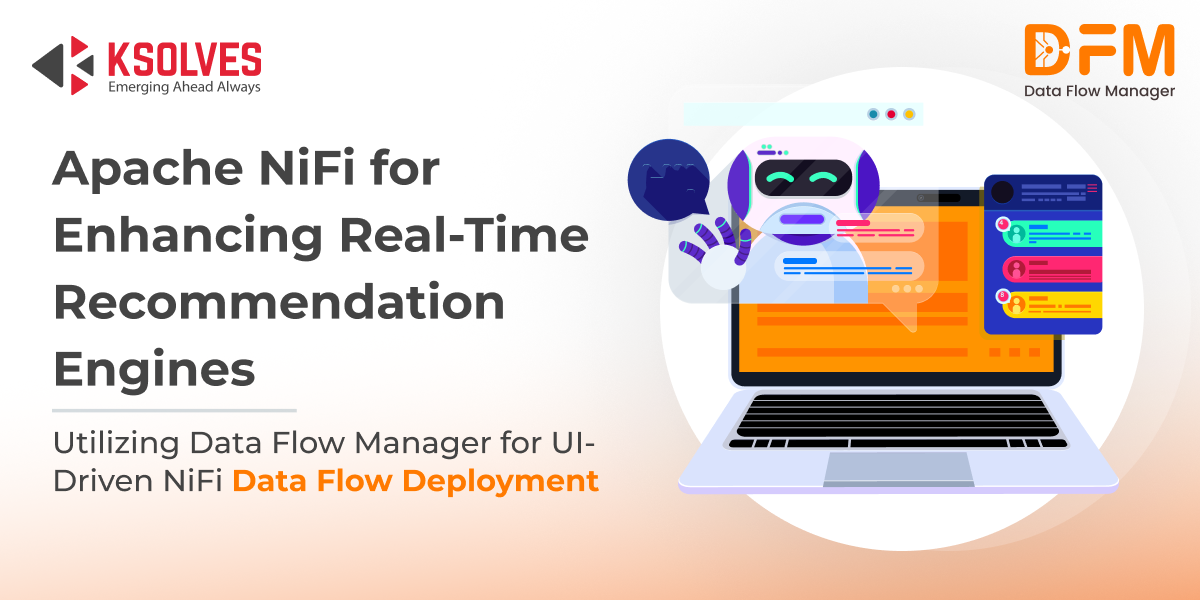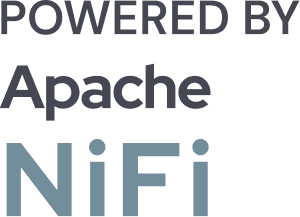How Does Apache NiFi Enhance Recommendation Engines for Streaming Platforms?
![]()

In the competitive world of streaming platforms, think Netflix, Spotify, Amazon Prime, users expect tailored content that speaks to their tastes and habits. Delivering these highly personalized recommendations hinges on the seamless flow and transformation of massive volumes of real-time data.
This is where Apache NiFi steps in.
Apache NiFi is a powerful data integration tool designed for real-time, scalable, and secure data movement across systems. It plays a pivotal role in fueling recommendation engines by ensuring that data flows smoothly, accurately, and on time.
In this blog, we’ll explore how Apache NiFi enhances recommendation engines, the key challenges it solves, and how tools like Data Flow Manager can elevate NiFi’s capabilities even further.
The Power Behind Personalized Streaming: Recommendation Engines
Recommendation engines are the unsung heroes of content discovery. They help platforms surface the most relevant songs, shows, or movies based on each user’s unique behavior.
At a technical level, these engines rely on models like:
- Collaborative filtering: “Users like you also liked…”
- Content-based filtering: “This show is similar to what you watched…”
- Hybrid models: Combining both for more nuanced suggestions.
To work well, these models need a constant supply of data:
- Viewing history
- Search queries
- Skipped content
- Ratings and likes
- Device type, location, time of day
- Metadata of content consumed
But acquiring, organizing, and delivering this data in real time—without losing fidelity or scalability—is a mammoth task. That’s where Apache NiFi shines.
Apache NiFi: The Engine Behind the Data Flow
Apache NiFi is an open-source data integration tool designed for real-time, scalable, and secure data movement. Think of it as a smart conveyor belt that can capture, transform, and route data across systems—all with minimal effort and maximum transparency.
Here’s what makes NiFi ideal for streaming platforms:
- A visual drag-and-drop interface for building and monitoring data flows.
- Native support for real-time ingestion from APIs, message queues, IoT devices, and databases.
- Built-in capabilities for data transformation, enrichment, and cleansing.
- Back-pressure handling, which ensures your systems don’t crash under high load.
- Provenance tracking which gives you a detailed audit trail for every piece of data.
- Security features like encryption, role-based access, and data lineage.
It’s no wonder organizations like Netflix, Spotify, and Hulu use NiFi (or similar frameworks) as part of their modern data stack.
The Real-World Challenges of Recommendation Engines
Recommendation systems on streaming platforms don’t just suggest content—they shape the user experience. Every click, skip, search, and like contributes to the evolving profile of a viewer, and systems must capture and respond to this behavioral data in real time. But achieving this requires overcoming some formidable challenges:
1. High Volume, High Velocity
Streaming platforms deal with an overwhelming flood of user interactions—millions of viewers engaging with content simultaneously, generating billions of events per day. Each second can bring thousands of “play,” “pause,” “skip,” or “like” events from across the globe.
Processing this massive stream of data with low latency is not optional—it’s essential. A lag in ingestion or analysis can lead to missed personalization opportunities and degraded user experience.
2. Diverse Data Sources
Data doesn’t come from a single, tidy source. Instead, it originates from a wide array of devices: mobile apps, smart TVs, laptops, web browsers, voice assistants, and even wearables. Each device may log data in a different format, frequency, and structure.
The challenge lies in creating a uniform data pipeline that can collect and harmonize this fragmented input into a centralized, consistent stream that recommendation engines can process in real time.
3. Data Quality and Consistency
Inaccurate or incomplete data is one of the biggest threats to recommendation accuracy. Data arriving with missing fields, inconsistent schemas, incorrect timestamps, or duplicated entries can mislead algorithms, resulting in irrelevant or even off-putting suggestions.
Maintaining high-quality data at scale requires not only validation and cleansing, but also contextual enrichment, such as geolocation, device type, or viewing history, to improve personalization outcomes.
4. Real-Time Responsiveness
In the world of streaming, timing is everything. A recommendation delivered a few seconds too late can feel disconnected from the user’s current intent. The experience must be fluid: as soon as a user finishes an episode, the next must be ready to roll based on their evolving preferences.
This requires ultra-fast data processing, low-latency updates to recommendation models, and seamless feedback loops—all of which depend on the underlying data pipeline.
NiFi helps platforms tackle these challenges head-on.
How Apache NiFi Enhances Recommendation Engines
Apache NiFi acts as a robust foundation for building these intelligent, responsive data pipelines. It offers a wide array of capabilities that help streaming platforms streamline, secure, and supercharge their recommendation engines.
1. Real-Time, Multi-Source Ingestion
Apache NiFi is built to ingest data from virtually any source—Kafka topics, cloud storage, REST APIs, WebSocket feeds, IoT devices, and more. It enables platforms to collect user activity across all devices and geographies without latency bottlenecks.
Whether it’s a binge-watching session on a tablet or a voice search from a smart TV, NiFi can instantly capture and forward the event to the right analytical service or model in real time.
2. Seamless Data Transformation
Raw user interaction data is rarely in a state that’s ready for direct use by a recommendation engine. NiFi allows you to:
- Normalize formats (e.g., converting JSON to AVRO or Parquet)
- Convert timestamps to a standard timezone or format
- Parse and flatten nested structures in JSON or XML
- Map internal/external IDs to unify user profiles
- Mask or redact sensitive data (like emails or IPs)
All of this is done on the fly, without manual coding or external transformation layers, making the data pipeline both faster and more agile.
3. Intelligent Routing and Filtering
Not every piece of user data is equally valuable. NiFi lets you apply conditional logic to route high-priority events, like user subscriptions or cancellations, to one system, while routing general behavior like browsing or playback to another.
You can filter out noise, enrich relevant data with external lookups (e.g., genre mappings or device metadata), and even apply machine learning-based scoring to prioritize certain events.
4. Scalable and Fault-Tolerant
Apache NiFi is designed for horizontal scalability, which means you can easily add more nodes to your cluster during high-demand periods—like when a blockbuster series is released and user activity spikes.
Its built-in back-pressure mechanisms ensure the system doesn’t get overwhelmed, while retry queues and failure processors make it resilient. Data won’t get lost—even if a system downstream goes offline temporarily.
5. Transparent and Compliant
In an age of strict data governance, knowing where your data came from, how it was changed, and where it went is not just helpful—it’s required. NiFi offers end-to-end data provenance, allowing teams to:
- Track the full lineage of every data point
- Audit transformations and routing decisions
- Demonstrate compliance with GDPR, CCPA, and other privacy regulations
This transparency builds trust in the system and simplifies audits or investigations.
A Streaming Scenario in Action
Imagine a user opens a streaming app and watches the trailer for a thriller movie, then skips to a documentary.
Here’s how Apache NiFi handles this in real time:
- Captures both events via REST API.
- Enriches them with user ID, device, and location.
- Filters out noise and keeps meaningful behavior (e.g., watched > 30 seconds).
- Sends the data to Kafka and then to your ML model.
- The model re-ranks recommendations based on the new inputs.
- NiFi routes updated suggestions back to the user’s device.
This entire loop takes place in seconds, creating a personalized, dynamic content journey.
Elevating Apache NiFi with Data Flow Manager
Designing robust data flows in Apache NiFi is just the beginning. To make these flows production-ready, they need to be thoroughly tested, validated, and deployed across different environments, typically from Development to Staging and finally to Production. But here’s the catch: manually exporting and importing NiFi flows between environments is time-consuming, error-prone, and far from scalable.
That’s where Data Flow Manager steps in to streamline the entire process.
What is Data Flow Manager?
Data Flow Manager (DFM) is a powerful tool for on-premise Apache to deploy, promote, and create NiFi flows within minutes. It completely eliminates the need for the NiFi UI and controller services, significantly reducing repetitive manual tasks and potential human errors that come with the manual approach.
With its intuitive user interface, Data Flow Manager enables users to:
- Deploy and promote NiFi data flows in minutes, removing the hassle of manually exporting/importing them.
- Schedule NiFi data flow deployments at specific times, which is perfect for off-peak hours, weekends, or maintenance windows.
- Maintain full audit trails with detailed logs of every change made to NiFi data flows.
- Version control each NiFi data flow, allowing teams to roll back effortlessly to previous stable versions if needed.
Whether you’re updating a recommendation model’s scoring logic or integrating a new behavioral signal into your pipeline, Data Flow Manager ensures that the NiFi data flow deployment, promotion, and creation process is fast, reliable, and transparent, helping teams focus more on innovation and less on operations.
In the context of recommendation engines, where even a slight delay or misconfiguration can impact personalization quality, this kind of automation is not just a convenience – it’s a competitive advantage.
Conclusion
Personalization is no longer a luxury – it’s a necessity. Streaming platforms that want to thrive must deliver tailored experiences in real-time. That means data must flow like water: instantly, intelligently, and without friction.
Apache NiFi empowers streaming platforms to build powerful, scalable, and reliable data pipelines that feed their recommendation engines with high-quality data. And with Data Flow Manager, teams can create, deploy, promote, and govern NiFi data flows effortlessly, ensuring faster iterations, fewer errors, and a better experience for every viewer.
![]()

